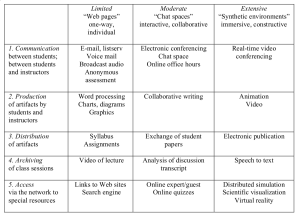Servatius, J. D. (2005). Commentary on “Educational Technologies and the Teaching of Ethics in Science and Engineering”. Science & Engineering Ethics, 11(3), 447-449.
She is not arguing with Loui but rather exlaining why ed tech seems an important topic for her. She raises and answers two additional questions:
“why do these technologies enhance learning and how can higher education faculty be supported in the appropriate uses of these technologies?”
Why? two things here: Production and communication. She says that ICT tools are not just for achieving the desired final product but rather a way of doing something. And pupils learn much during the process. The way they communicate via tech tools is close to a real life situation.
How? Good example about older generation: a professor misuses the PowerPoint presentation by filling it with text and lecturing anyway. “Just with the lights off”.  “/…/ it is important that college administrators recognize this and support faculty members in their journeys to integrate instructional technologies, as Loui says “…not merely to duplicate conventional pedagogies, but to promote intellectual engagement.”
“/…/ it is important that college administrators recognize this and support faculty members in their journeys to integrate instructional technologies, as Loui says “…not merely to duplicate conventional pedagogies, but to promote intellectual engagement.”
